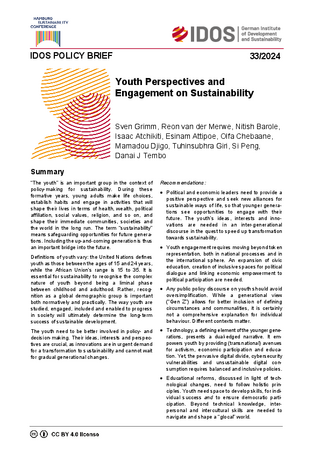Youth perspectives and engagement on sustainability
Grimm, Sven / Reon van der Merwe / Nitish Barole / Isaac Atchikiti / Esinam Attipoe / Olfa Chebaane / Mamadou Djigo / Tuhinsubhra Giri / Si Peng / Danai J TemboPolicy Brief (33/2024)
Bonn: German Institute of Development and Sustainability (IDOS)
DOI: https://doi.org/10.23661/ipb33.2024
“The youth” is an important group in the context of policy-making for sustainability. During these formative years, young adults make life choices, establish habits and engage in activities that will shape their lives in terms of health, wealth, political affiliation, social values, religion, and so on, and shape their immediate communities, societies and the world in the long run. The term “sustainability” means safeguarding opportunities for future generations. Including the up-and-coming generation is thus an important bridge into the future.
Definitions of youth vary: the United Nations defines youth as those between the ages of 15 and 24 years, while the African Union’s range is 15 to 35. It is essential for sustainability to recognise the complex nature of youth beyond being a liminal phase between childhood and adulthood. Rather, recognition as a global demographic group is important both normatively and practically. The way youth are studied, engaged, included and enabled to progress in society will ultimately determine the long-term success of sustainable development.
The youth need to be better involved in policy- and decision-making. Their ideas, interests and perspectives are crucial, as innovations are in urgent demand for a transformation to sustainability and cannot wait for gradual generational changes.
Recommendations:
- Political and economic leaders need to provide a positive perspective and seek new alliances for sustainable ways of life, so that younger generations see opportunities to engage with their future. The youth’s ideas, interests and innovations are needed in an inter-generational discourse in the quest to speed up transformation towards sustainability.
- Youth engagement requires moving beyond token representation, both in national processes and in the international sphere. An expansion of civic education, creation of inclusive spaces for political dialogue and linking economic empowerment to political participation are needed.
- Any public policy discourse on youth should avoid oversimplification. While a generational view (“Gen Z”) allows for better inclusion of defining circumstances and communalities, it is certainly not a comprehensive explanation for individual behaviour. Different contexts matter.
- Technology, a defining element of the younger generations, presents a dual-edged narrative. It empowers youth by providing (transnational) avenues for activism, economic participation and education. Yet, the pervasive digital divide, cybersecurity vulnerabilities and unsustainable digital consumption requires balanced and inclusive policies.
- Educational reforms, discussed in light of technological changes, need to follow holistic principles. Youth need space to develop skills, for individual success and to ensure democratic participation. Beyond technical knowledge, interpersonal and intercultural skills are needed to navigate and shape a “glocal” world.


